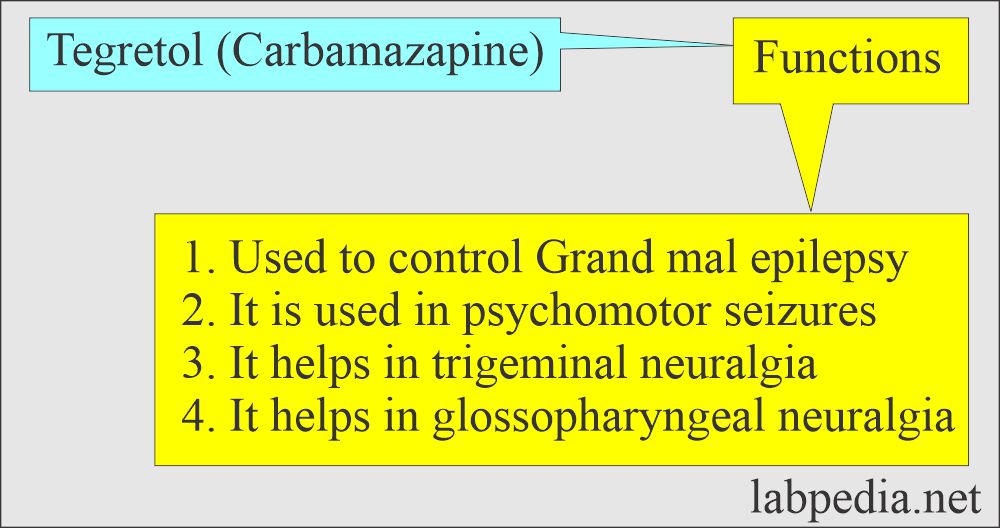Tegretol level (Carbamazepine)
Tegretol (Carbamazepine)
What sample is needed for the Tegretol level?
- The serum of the patient is required.
What are the indications for Tegretol (carbamazepine) level?
- It is advised in Epileptic patients on Tegretol therapy.
- This may also be used in trigeminal neuralgia.
- Also, this has a beneficial effect on glossopharyngeal neuralgia.
What is the purpose of the Tegretol (carbamazepine) level estimation?
- The carbamazepine test is used to measure and monitor the amount of carbamazepine in the blood to determine the following:
- Whether the level of the drug is within the therapeutic range.
- So, the drug dose may be adjusted up or down until the blood level reaches the therapeutic range.
- A routine carbamazepine test measures total protein-bound and free-drug portions.
How would you discuss the Pharmacology of Tegretol (carbamazepine)?
- Carbamazepine is similar to a tricyclic antidepressant.
- Dose = 400 to 1600 mg /day in two doses.
- This is used to control grand mal and psychomotor seizures.
- This can help to relieve the pain of trigeminal neuralgia.
- Its mechanism of action is to reduce synaptic transmission in the spinal cord.
- This can be used in other seizures where there is pain.
- Side effects are related to the dose of the drug, and these are neurological.
- There may be visual and vestibular changes.
- There may be ataxia, nausea, and vomiting.
- The patient may have a rash and agranulocytosis.
- In chronic cases, they may have hepatic failure.
- Metabolism: the drug is in the liver and has a half-life of 5 to 25 hours.
What is the mechanism of Tegretol (Carbamazepine)?
Tegretol (Carbamazepine) is effective for seizures and trigeminal neuralgia by balancing nerve signals.
What are the side effects of Tegretol?
- There may be nausea and vomiting.
- The patient may get dizziness and drowsiness.
- There are dry mouths and swollen tongues.
- Patients may develop a loss of balance.
- Stopping the Tegretol may lead to seizures.
- Contraindicated in the following conditions:
- In the case of heart disease.
- In patients with liver or kidney disease.
- Patients with the presence of glaucoma.
- Take care of thyroid diseases.
- In the case of an autoimmune disease like Lupus.
What is the normal dose of Tegretol?
- Tegretol is an anticonvulsant drug.
- Therapeutic range = 4 to 8 µg/mL.
Toxic Level = > 20 µg /mL.
Questions and answers:
Question 1: What is the toxic level of Tegretol?
Question 2: What is another name of Tegretol?

